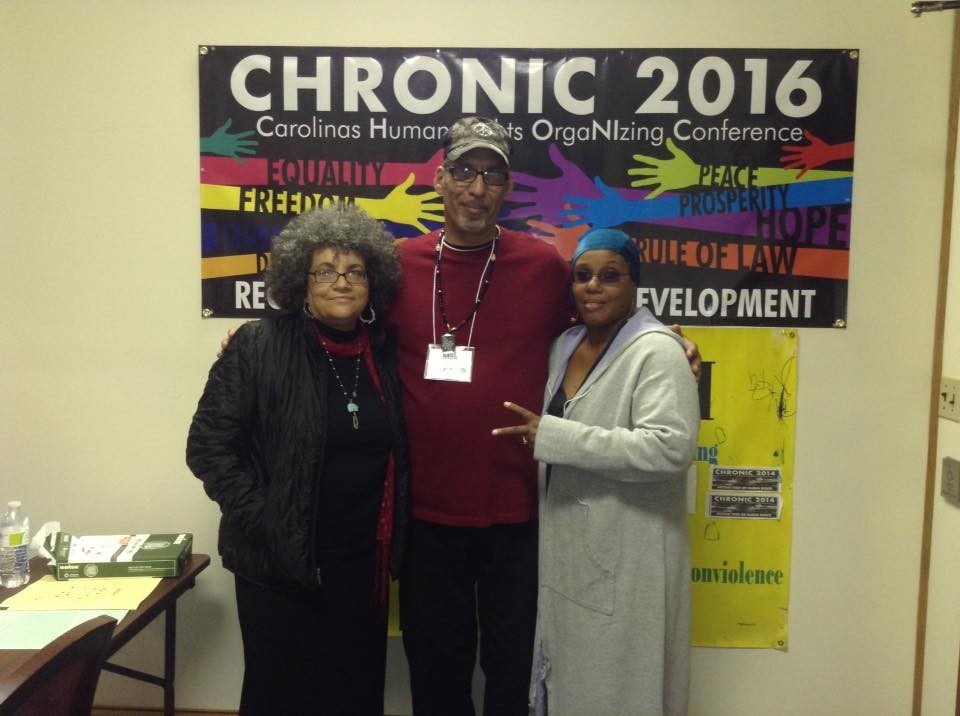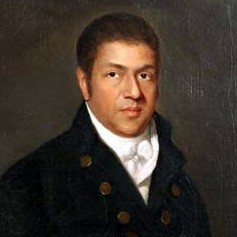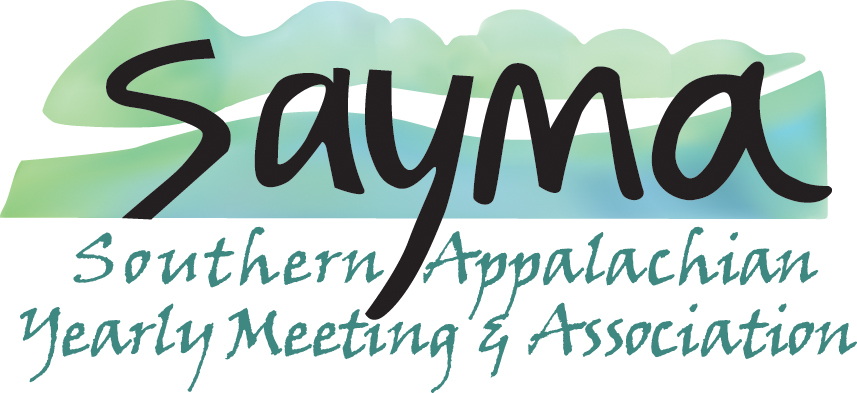SAYMA Uplifting Racial Justice Committee

| About Us | Minutes and Reports | Resources |
About Us
Vision
SAYMA-URJ envisions a Yearly Meeting community where every Friend of color feels welcome. We see a SAYMA community where the divine Light within every Friend of color is affirmed, their unique history, spiritual journey and lived Truth is honored, where our messages and concerns are heard and respected with due consideration. We see a SAYMA community where Friends of color are empowered to build close spiritual Friendships, appreciation, love and support for the weighty responsibilities we carry as people of color, embodying Quaker Testimonies. Within and outside of the Religious Society of Friends.
Mission
To help SAYMA become a welcoming place for Friends of color. The committee will do this by providing safe space for Friends of color to bring issues and concerns regarding racism within their Monthly Meetings and SAYMA, to find support and advocacy. The committee will also work to raise awareness about White Supremacy aka racism within SAYMA, by compiling and disseminating educational resources.
- URJ works in collaboration with the Friends Center for Racial Justice (FCRJ).
- URJ supports the Paul Cuffee Abolitionist Center, a non-profit educational organization which produces Abolition Today, a weekly online radio program with specific focus on modern slavery as it is practiced through the 13th amendment of the US Constitution and by private for-profit prisons worldwide. The show airs live Sundays 7PM EST. 4PM PST and 5 Central.
- URJ established The Paul Cuffee Worship Group at the Abolitionist Center, in fulfilment of its mission to provide support and advocacy for Friends of color experiencing racism. It is a safe anti-racist space for people of color who wish to worship in the manner of Friends.
 Who was Paul Cuffee? PDF
Who was Paul Cuffee? PDF- About Quaker Racism is a private Facebook group intended to be a place where group members can have productive, constructive, and/or challenging discussions about white supremacy/racism within the Religious Society of Friends. The group has over 1,137 Friends, and growing, from all over the world, specifically discussing racism within the religious Society of Friends.
- SAYMA Uplifting Racial Justice (URJ) provides support and advocacy for Friends of Color experiencing racism. To that end URJ established an Uplifting Racial Justice Fund. It is a donor-restricted tax-exempt fund. Donors may specify the purpose of donor-restricted contributions to the URJ Racial Justice Fund in one of three ways:
- Memo line of check
- Note or letter accompanying check
- SAYMA Contribution form: PDF
Questions: Please email treasurer@sayma.org.
Minutes and Reports
- Vision, Mission, and Goals PDF
- History of URJ in SAYMA Minutes PDF
- SAYMA Gathering 2019 Report PDF
- September 2019 Report PDF
- Assessment of September 2019 Rep Meeting PDF
- Finance Requests (07-20-2020) PDF
- Open letter to clerk of Finance Committee (08-09-2020) PDF
- Latest News on the SAYMA Anti-Racism Front (08-28-2020) PDF
- September 2020 Report PDF
- March 2021 Report PDF
- October 2021 Report PDF
- June 2023 BIFOC Epistle PDF
- November 2023 Report PDF
- April 2024 Report PDF
Resources
White Fragility* Self-Test
Ask yourself the following:
- Do I feel defensive when a person of color says "white people?"
- Do I feel angry when people tell me that I benefit from white privilege?
- When a person of color talks about race, do I feel defensive because they're describing things that I do or think as racist?
- Do I feel angry or annoyed by the above questions?
- Do I have a history of embracing or growing up in racism that I feel ashamed of and so I need to show people that I'm not racist anymore?
- Does saying "Not all white people" or similar phrases make me feel better when someone calls white people out for something?
- Do I expect an apology when I feel like I've been unfairly accused of racism?
- Do I feel better when I say, hear, or read, "It's okay to be white?"
- Do I try to convince people of color that they're wrong about racism by pointing out people from their racial group who agree with me?
- Do I feel the need to talk about how hard my ancestors had it when they immigrated, or explain my own hardships when a person of color talks about being oppressed?
- Do I think that racism would go away if people stopped talking about it?
- Does being told that something I say, think, do, or otherwise value is racist make me want to shut down, leave, or express my discomfort/displeasure in some way?
- Do I feel the need to state that I have friends/family who are people of color when someone accuses me of racism?
- Do I feel the need to prove that I'm not racist?
- Do I feel that my opinions and perspectives about race should be given equal weight to that of a person of color, that I have something unique and important to contribute to the race conversation, and/or that it is unfair to be told to listen more than I speak?
- Do I feel the need to defend myself on any of the above points in the comment section?
If you answered yes to any of these questions, you are dealing with white fragility. Take time to reflect on why you feel the way that you do. Take time to listen to different perspectives.
White fragility is a hindrance to racial healing because it prevents people of color from being able to engage white people in honest conversation without also having to bear the burden of catering to white people's emotional comfort.
At its worst, white fragility can cause an emotionally unhealthy situation for people of color because of racial power dynamics and the weight of being responsible for white folks' feelings while not having space to express our own. There is also the weight that comes with people that you care about lashing out at and abusing you (verbally, emotionally, and/or digitally).
If we cannot talk honestly about the issues, then we cannot make progress.
*White Fragility, as defined by DiAngelo, is the result of white racial socialization. A state in which even a minimum amount of racial stress becomes intolerable, triggering a range of defensive moves. These moves include the outward display of emotions such as anger, fear, guilt, and behaviors such and as argumentation, silence, and leaving the stress-inducing situation. These behaviors, in turn, function to reinstate white racial comfort and status quo.
URJ-Recommended Media
Articles
- Shelterforce: Long Before Redlining: Racial Disparities in Homeownership Need Intentional Policies
- Center for American Progress: Systemic Inequality: Displacement, Exclusion, and Segregation
- The Root: How to Be a Better White Person in 2020
- Speaking My Truth: Ongoing Racial Conflict at SAYMA: An open letter to White Quakers
Books
Books by White Scholars About Whiteness: for White people who are tired of talking about race. This list is for beginners. We recommend reading at least four books from this list, before moving on to books on racism by scholars of color.
- Birth of a White Nation: The Invention of White People and Its Relevance Today, Jacqueline Battalora, PhD
Begins with an exploration of the moment in time when white people, as a separate and distinct group of humanity, were invented through legislation and the enactment of laws. - What Does It Mean To Be White: Developing White Racial Literacy, by Robyn DiAngelo, PhD
- White Fragility: Why It's So Hard For White People To Talk About Racism, by Robin DiAngelo, PhD
- Deep Denial: The Persistence of White Supremacy in United States History and Life, by Rev. David Billings
Part popular history, part personal memoir — documents the 400-year racialization of the United States and how people of European descent came to be called white. . . focuses primarily on the deeply embedded notion of white supremacy, and tells us why, despite the Civil Rights Movement and an African-American president, we remain a nation hard-wired by race. - The Heart of Whiteness: Confronting Race, Racism, and White Privilege, by Robert Jensen, PhD
An honest look at U.S. racism, and the liberal platitudes that attempt to conceal it. As devastating as the physical destruction brought by Katrina has been, it may turn out that one of the hurricane's most enduring legacies is the way it made visible the effect of racial and class disparities on who lived and who died, who escaped early and who suffered from being left behind. - Becoming and Anti-racist Church: Journeying Toward Wholeness, by Rev. Joseph Barndt
Specifically for faith community leaders - Understanding and Dismantling Racism: The Twenty-First Century Challenge to White America, By Joseph Barndt
Traces the history of racism, revealing its various personal, institutional, and cultural forms. . . offers specific, positive ways in which people in all walks, including churches, can work to bring racism to an end. - Uprooting Racism: How White People Can Work for Racial Justice, by Paul Kivel
- When Affirmative Action Was White: The Untold History of Racial Inequality in Twentieth Century America, by Ira Katznelson
Fundamentally recasts our understanding of twentieth-century American history and demonstrates that all the key programs passed during the New Deal and Fair Deal era of the 1930s and 1940s were created in a deeply discriminatory manner.
Anti-Racism Google Group
SAYMA Anti-Racism Networking Google Group offers an informal forum for F/friends to support each other in working against racism, supporting Friends of color, and moving forward on anti-racism work at the yearly meeting level and in our communities. It is not an official SAYMA social media group or attached to any committee. Anyone can join the group and post messages. The manager can add people to the group, but does not control content. Contact Susan Firestone to be added to the group.
About Quaker Racism Facebook Page
About Quaker Racism is a private Facebook group intended to be a place where group members can have productive, constructive, and/or challenging discussions about white supremacy/racism within the Religious Society of Friends.
We ask that members of this group have some active or ongoing connection to the Religious Society of Friends. We realize that some Friends may need an occasional time out — short or extended — away from active Quaker involvement. We trust the discernment of all group members to identify for themselves the appropriateness of their continued involvement.

